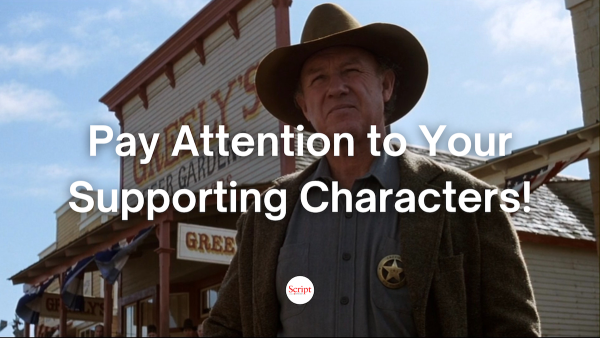Legally Speaking, It Depends – The Business of Screenplay Feedback
Christopher Schiller discusses feedback – how to take it, what to do with it, how to give it and how not to shoot yourself in the foot career-wise while dealing with it.
This article is a little less legal-y and a lot more business-y but still would be good to know as you navigate your screenwriting career. The subject is screenplay feedback, how to take it, what to do with it, how to give it and generally how not to shoot yourself in the foot career-wise while dealing with it.
What is feedback?
Feedback can come in a myriad of forms. Notes, comments, suggestions, demands, alterations, polish, considerations, “here's an idea” offerings; just about anything can be considered feedback. Anything offered to assist the storytelling from an outsider can be considered feedback.
Feedback comes from a perceived lack or opportunity. If the contributor feels something is missing or the project could be enhanced by an addition of something they can convey that feeling by giving feedback. Of course, feedback can also be about what they like and don't want to see changed. That might be the easiest to deal with but still needs to be handled delicately, especially if there is more than one varying opinion about the same elements.
Feedback can come from anywhere or anyone and its relevance and value doesn't always reflect the source. However, how you react to the feedback should ALWAYS reflect the source. That's the tricky bit. Even with a lifetime of practice there is always a learning curve as to how to better handle feedback and those that give it.
How to evaluate feedback
The story always matters. Regardless of the source or content of the feedback, the touchstone to evaluate it by is simply,
“does it make the story better?”
Now evaluating what “better” is goes way beyond the scope of this-- or any-- article. Still, make sure that with whatever change is suggested you ask that most important question.
But that's not the only question to ask. One important question that is often overlooked is, “how will my reaction to this feedback affect my career?” Sometimes it doesn't matter whether you take or ignore the feedback, but, how you let the offerer know your intention is what has the most impact in your career as a writer. The screenwriter Christopher McQuarrie recently tweeted, “Sometimes, all it takes is screaming at someone for ten minutes that it'll never work to realize how it can totally work.” We all process taking feedback in our own way, but, how we do that can easily affect how we are perceived as a professional, especially if they have not much else to go on (read: “new writer”).
How best to react to given feedback can depend on who is giving it and where they sit in the business hierarchy. But the type and style of feedback also derives from the point of view of the giver.
Where feedback comes from
Perspective – the type of feedback will reflect greatly the perspective of the giver. Consider that a fellow writer will give feedback from the point of view of how they'd write it. The actor will give feedback from how they'd portray the characters. A producer will give feedback on how the story will play to an audience or how the production can be made more economical (hopefully without sacrificing the story, but, that's mostly your job anyway.) Each perspective is valid and necessary to have a well rounded, successful production. But determining the perspective from which feedback is given has to be taken into account when evaluating it otherwise you'll face the dilemma of the story of the blindfolded men discussing an elephant. Every perspective is biased to its own view. Remember the key question.
Power – some feedback, by nature of the position of power of the person giving it, needs to be given due consideration. If the studio chief gives notes, it's best if you seriously consider them. That's not to say you have to blindly apply the changes inferred. Remember the key question. But your reasoning better be sound in order to reject the comments and still allow the executive to feel their input was valued and the project is in good hands. When a suggestion given by the office janitor can be considered and dismissed with a nod (but make sure it is not a good note first), a more formal exchange and explanation might be necessary for rejecting feedback from higher ups.
Expectation – also consider the expectation of how feedback is to be received by those that give it. The janitor's two cents comes with a different expectation than the executive producer's demands. If a feedbacker has a high level of expectation that their notes will be addressed, you will have to treat them well, whether you accept them or chose to go another route. If a director is giving feedback, it is likely that the changes are considered necessary in her eyes, therefore, any resistance must have sufficient reasoning and even then, might not be acceptable. In those cases your choices are do the changes anyway or walk away from the project.
Why feedback is given
The “good job” kind of positive feedback doesn't usually require change. As stated earlier, most feedback comes from a perceived lack or opportunity to do more within the work. The desire is to create an improved end result in some way. Unfortunately, feedback can also come merely from a perceived duty of the giver, whether useful or not. This is when a commenter feels the need to show they're involved in the project to their higher ups or to make themselves look good. Too often this can lead to poor feedback that fails to advance the project's goals or even would reverse advances. Responding to these misguided “contributors” must still be done within the context of the heirarchy of the production, giving even crappy notes from higher ups a gentle refusal. If you're skilled, or lucky, this can be done without anyone noticing. After all, they're not intending to harm. Realize that only a fool would give feedback in a direct attempt to sabotage. Feedback is always potentially useful. Look for the purpose behind the suggestions to fully evaluate them.
What to do with feedback
Once you've received feedback you need to figure out what to do with it.
Consider the source – In this sense it is meant to consider the particular perspective and scope from which the feedback was given. If an actor has given you good notes on their character remember to look at how the changes would affect the rest of the players as well as the story as a whole. You need to fill in the gaps when considering any feedback for those areas not addressed by the comments.
Consider your investment – Sometimes even the best comments would require so much rewriting of the original story that you no longer have the heart to change your original ideas that much, even if the resultant story would be a good one. This is a tough call for a writer, but, one that is important not to forget. Licking your wounds and moving on instead of drudging out a script you don't feel connected to might be the better choice. Making that hard choice is often the best career move in the long run.
When to walk away/ignore it – Sometimes, short of walking away, you might be best served to deny the feedback and trudge forward without it. Be prepared for the brushback that might come by not applying the notes, and have your explanations at the ready. But sometimes the writer does know best and at those times it is up to the writer to prove it.
What to look out for
Within the decision making process whether to use feedback or not you should be aware of the potential traps to which you might be exposed. Even unwittingly and with best intentions these gotchas could cause havoc to the final product.
Watch out for the spinning your wheels syndrome. This is when you follow one person's feedback only to get an equally useable but opposite minded suggestion from an equally respected source. Quite easily you can find yourself ping-ponging your writing depending on who was the last one to read your latest draft. When there are two good directions you could go and you are getting suggestions towards both, pick one and stick with it and explain it to the other camp.
Also watch out for ego trips from your feedback sources. It is easy for a writer to find themselves stuck between two big wigs using you as a pawn in their internal pissing match. Even if they're giving you valid choices, if you can manage to avoid the confrontation all together you will rest easier and not be fodder in the war. Fodder doesn't fair well.
This can also play into the baby out with the bathwater syndrome. This is where you have taken and followed changes indicated by valid feedback from one source, but, by the time you've completed the rewrite the feedback provider has been ousted from their position or no longer work there. There's little you can do if it is a whole scale changing of the guard, but, if you can see the writing on the wall best make it appear that you are not aligned with the parties on the outs. And if you can manage that, let me know how you did it. Very tricky, that.
How to give feedback
Eventually the table will turn and you will be asked to give your feedback on someone else's work. Here are some pointers to remember.
How to phrase your feedback
Don't write for the writer – The current writer is paid to write. Even if you are also a writer, the worst thing you can do is tell them, “You know that scene that doesn't work? Here's exactly how you should write it.” It's disempowering, insulting and sure to meet resistance and cause animosity. Pointing out the problems is appropriate, then allow the working writer to use their own skills and ideas to implement the necessary changes. That's their job. I mean you wouldn't want that to happen to you, would you?
Don't produce from the keyboard – If you are not the producer don't wear the producer hat and make decisions for them when providing feedback. You should always keep aspects of production in the back of your mind when giving notes, but, if the story needs to be told bigger (read: more producer headaches) let the producer worry about that. You might give them a heads up in the note to let them know you considered the issues you're introducing. But leave it to the producer to make the decision about how to handle the changes you suggest. If they ask for your input or perspective, give it to them in that context. But if they ask for your ideas to make things better, stay on track. This may be a subtle difference, but, if you recognize it you'll find a lot more producers willing to come to you for the betterment of the project instead of the surrendering of their job duties.
Don't direct for the director (but you sometimes have to for the reader) – Similarly, feedback on what makes the story better shouldn't be directing from the page. As a writer you've often been advised that you need to leave directorial decisions to the director and the same goes for giving story feedback. Directors bring their own unique perspective to their projects. The same story can be told many different ways equally as compelling in each case. Imposing your own directorial approach on someone else is unfair to what they bring to the table and causes friction. Again, if they approach you on how to direct a scene and you have an idea, that is the time to share it. Story notes should concentrate on story.
The parenthetical note above is the tricky bit. Sometimes when you're giving notes there isn't a director on board as yet and the readers who are going to see the work-- including a lot of producers-- don't have the experience in reading between the lines. You need to be careful about how you express just enough of what is really the director's job to get the message across to these readers without leaving too much residue for the eventual director to feel offended. Judge your audience and give just enough and no more of what's lacking to get it to the next stage.
The tenet that seems to lie under all these is, “Know but don't show unless you have to.” It's a difficult skill but a worthwhile one to exercise.
Conclusion
Feedback can be valuable, if taken to heart, considered and applied toward a better result.
Feedback can be hurtful when ignored, misinterpreted or given short shrift.
Feedback is a loop. Once given, the end result often reveals more opportunities to improve the product.
Hopefully this business-y column has helped. I'd be willing to entertain any feedback you are willing to give me because, after all, it depends.
Related Articles and Tools to Help:
- More Legally Speaking, It Depends articles by Christopher Schiller
- Script Angel: Script Feedback
- Balls of Steel: Script Consultants - Are They Worth It?
Learn more about the craft and business of screenwriting and television writing from our Script University courses!
Christopher Schiller is a NY transactional entertainment attorney who counts many independent filmmakers and writers among his diverse client base. He has an extensive personal history in production and screenwriting experience which benefits him in translating between “legalese” and the language of the creatives. The material he provides here is extremely general in application and therefore should never be taken as legal advice for a specific need. Always consult a knowledgeable attorney for your own legal issues. Because, legally speaking, it depends... always on the particular specifics in each case. Follow Chris on Twitter @chrisschiller or through his website.







